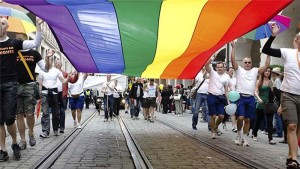by Shelby Vcelka
Impunity Watch Desk Reporter, Europe
DUBLIN, Ireland–
Voters in the Republic of Ireland are set to partake in a national referendum on 22 May to legalize gay marriage. The measure Ireland will ask its citizens to vote on is whether “marriage may be contracted in accordance with law by two persons without distinction as to their sex.” If the measure passes, it will be the first time gay marriage has been legalized through a national vote, rather than through the legislature or the court system.

The referendum marks a profound change in Irish politics, as the power of the Catholic Church has collapsed in recent years. Although 85 percent of the population still identifies as Catholic, priests no longer have unchallenged authority on political issues. Ireland, a historically socially conservative country, has been “one of the toughest places in the western world to be gay” because of its religious roots. As recently as 1993, homosexuality was criminalized, and was only legalized because of pressure from European authorities.
The changing political atmosphere and growing separation of Church and State has placed religious leaders against political leaders. Though the Catholic Church has not been incredibly active in the gay marriage referendum, they have encouraged Catholics to vote No.
In statements read out during Sunday Masses, the Catholic Bishops challenge claims from Yes activists that the measure would not substantially affect anyone besides members of the LGBT community. The Bishops argue that, while they do not want to alienate or belittle anyone, a Yes vote would abolish the traditional institution of marriage that is fundamental to the sustaining of human life and of a functioning society.
Conversely, the Yes activists argue that Ireland is ready to legalize gay marriage, as the younger generations are more tolerant and accepting.
Besides the Catholic Church, there are very few Irish establishment organizations that oppose same sex marriage. The government, major political parties, media organizations, unions and business groups all support a Yes vote.
Currently, polls show Irish voters favor a Yes vote by 58%, with 25% voting No, and 17% undecided. Although the polls appear solidly Yes, turnout could be an issue for same sex marriage legalization. In 1995, with the referendum to legalize divorce, a Yes vote passed 51% to 49%. Previous to that referendum, the vote showed most citizens favored legalization of divorce. Voter apathy and lack of turnout ended up making the vote that close.
If Ireland votes Yes, it will be the 18th country to legalize gay marriage. 13 of those countries are in Europe, with Slovenia being the most recent in March 2015.
For more information, please see–
BBC- Ireland’s divisive referendum on same-sex marriage— 01 May 2015
Independent–Alan Shatter: The majority of people will support the equality marriage proposal— 06 May 2015
Washington Post– Ireland could be first nation to legalize same-sex marriage by popular vote— 16 May 2015
Al Jazeera– Ireland appears set to say ‘yes’ in gay marriage vote— 17 May 2015
BBC– Same-sex marriage: Catholic bishops pen letters ahead of referendum— 17 May 2015
The Guardian–The same-sex marriage referendum has transformed Ireland before it’s even begun— 17 May 2015


